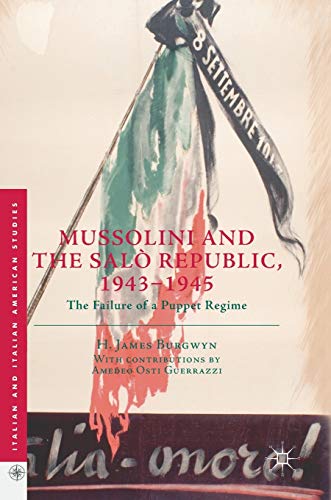
Mussolini and the Salò Republic, 1943–1945
by H. James Burgwyn
"The Failure of a Puppet Regime"
Popularity
1.39 / 5
* A book's popularity is determined by how it compares to all other books on this website.
Where to buy?
Buy from Amazon* If you buy this book through the link above, we may receive a small commission at no extra cost to you.
Mussolini and the Salò Republic, 1943–1945 by H. James Burgwyn
Details
War:
World War II
Perspective:
Researcher
Biography:
No
Region:
Europe
Published Date:
2018
ISBN13:
9783319761886
Description
Brief Summary
Mussolini and the Salò Republic, 1943–1945 by H. James Burgwyn provides a comprehensive examination of the Italian Social Republic (RSI). Established in 1943 by Adolf Hitler in Salò, Italy, this regime was Benito Mussolini's final attempt to uphold Fascism during World War II. The book details the governance of the RSI, its internal contradictions, and its relationship with Nazi Germany. Burgwyn also delves into the personalities who drove the regime and the atrocities committed under its banner. Importantly, the book culminates with the controversial end of Mussolini's life, offering readers deep insights into the factors that led to the collapse of this puppet state.
Main Themes and Topics
The book tackles several critical themes, including the resilience and decline of Fascism in Italy, the complex political relationships during WWII, and the moral decay within the Salò Republic as it struggled for survival. Burgwyn also explores the ideological conflicts and power struggles among the leaders of the RSI, highlighting the tension between their loyalty to Mussolini and their obligations to the Nazi regime. This period is marked by a chaotic mix of ideologies and realpolitik, mirroring the broader collapse of Axis powers in Europe.
Writing Style and Tone
H. James Burgwyn adopts a narrative style that is both analytical and vivid. The prose is enriched with detailed portraits of key figures within the Salò Republic, capturing their motivations and the impact of their actions. The tone is scholarly yet accessible, with Burgwyn skillfully balancing factual exposition with engaging storytelling. His judicious use of primary sources adds depth and authenticity to the historical analysis, making the book a compelling read for both scholars and history enthusiasts.
Criticism
While Burgwyn provides an exhaustive account of the Salò Republic, some readers may find the density of historical details overwhelming at times. The focus on military and political descriptions can occasionally overshadow the personal narratives, which may limit the broader humanistic perspective of the era's impact on ordinary Italians.









